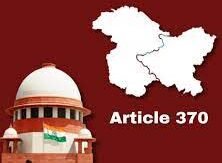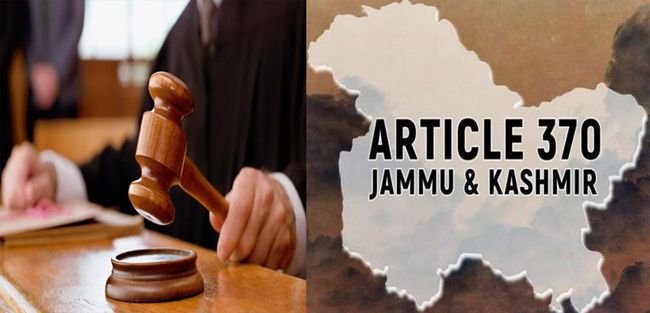
In a seismic occurrence destined to send reverberations through the echelons of power and sway, the Supreme Court of India issued a watershed decree today, affirming the government’s stance on nullifying Article 370 in Jammu and Kashmir. This momentous adjudication, articulated by Justice Chandrachud, signifies the apex of a protracted legal odyssey that has ensnared the nation’s focus and kindled fervent discourses on the constitutional framework of India.
The Origins of the Legal Struggle
The legal skirmish, instigated by a series of pleas contesting the government’s action to revoke the special status accorded to Jammu and Kashmir under Article 370, has unfolded as an extended affair. The pleas posited that the transformation of the state into a Union Territory sans the state’s concurrence transgressed constitutional tenets, alleging it to be unconstitutional, capricious, and illicit.
Legal Contention
The petitions contesting the government’s move contended that the resolution to convert Jammu and Kashmir into a Union Territory without the state’s consent was unconstitutional, arbitrary, and illegal. The legal fracas pivoted on the construction of Article 370 and the constitutional soundness of the Jammu and Kashmir Reorganisation Act, 2019.
Revelation of Supreme Court Proceedings

The Constitution bench, spearheaded by the distinguished Justice Chandrachud, meticulously deliberated on the nuanced contentions presented by both the petitioners and the government. The proceedings unfurled with an intensity that underscored the gravity of the matter. As legal luminaries propounded their arguments, the nation held its collective breath, keenly cognizant of the far-reaching implications of the impending judgment.
Justice Chandrachud’s Pronouncement
In a courtroom steeped in anticipation, Justice Chandrachud delivered a judicious and meticulously crafted verdict. The crux of the judgment rested on the interpretation of Article 370, a provision that had conferred special autonomy upon Jammu and Kashmir for decades. Justice Chandrachud, in his pronouncement, accentuated the transient nature of Article 370, emphasizing its original intent as a provisional provision rather than a permanent fixture of the Indian Constitution.
Pivotal Ruling on Article 370
The Supreme Court’s decision to validate the abrogation of Article 370 carries profound implications for the region of Jammu and Kashmir. The unique privileges bestowed upon the state under this article have now been extinguished, paving the way for a new epoch in the annals of the Union’s history. The ruling fortifies the government’s stance on the unity and integrity of the nation, indicating a departure from the historical autonomy enjoyed by Jammu and Kashmir.
Implications of the Verdict
The Supreme Court’s decision holds significant ramifications for the political and constitutional panorama of Jammu and Kashmir. The annulment of Article 370 implies that the region no longer enjoys the special autonomy it once possessed. The judgment reaffirms the principle of the unity and integrity of the Indian Union.
Public and Political Reverberations
As news of the verdict permeated the nation, diverse reactions emanated from the public and political spheres. Proponents of the government’s action hailed it as a decisive stride toward the integration of Jammu and Kashmir into the national mainstream. Conversely, voices expressing apprehensions over the potential dilution of the region’s cultural and political identity have been equally vehement.
Constitutional Precedent and Legal Framework
The Supreme Court’s decision establishes a formidable constitutional precedent, providing clarity on the interpretation of temporary provisions within the Indian Constitution. Legal scholars and practitioners will assuredly scrutinize this ruling as a benchmark for future challenges to constitutional amendments. The judgment, in its meticulous legal reasoning, weaves a narrative that extends beyond the specific case at hand, leaving an indelible mark on India’s constitutional jurisprudence.
International Perspectives
Beyond the borders of India, the international community is closely monitoring the aftermath of this landmark ruling. The decision on the abrogation of Article 370 is poised to become a subject of diplomatic discussions, potentially influencing India’s relationships with neighboring nations. The global implications of this judgment are yet to fully unfold, but its resonance on the international stage is unmistakable.
Conclusion

In the hallowed halls of the Supreme Court, Justice Chandrachud’s verdict on the pleas challenging the abrogation of Article 370 has etched a defining moment in the annals of Indian constitutional history. As the nation grapples with the implications of this ruling, it is evident that the legal, political, and social landscape of Jammu and Kashmir has undergone a seismic shift. The Supreme Court, through its resolute judgment, has steered the course of the nation’s destiny, leaving an indelible imprint on the collective consciousness of its citizens.










